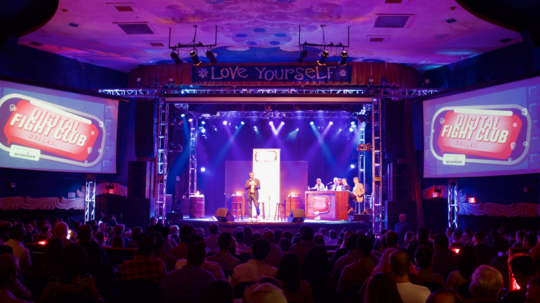
Wednesday night, the Granada Theater played host to five rounds of head-to-head combat with some of the top minds in tech and innovation from across the state.
Founders, CEOs, CTOs, and the likes duked it out over some of the hottest topics of debate going on in the tech world. Everything from balancing public safety with the boom in the e-scooter market to where the boundary between personalized ads and privacy lays.
“Here’s what I love about Digital Fight Club: [the contestants] come in with their ideas, but the refs get to take us where they want to take us,” said Michael Pratt, founder of Digital Fight Club and the night’s MC, at the event.
The audience consisted mostly of fellow founders, VCs and other business leaders from around the Metroplex. The referee squad, mostly there to moderate and ask questions of the “fighters,” was made up of:
- Andrew Hopkins, MD at Accenture
- Nick Reddy, Baylor, Scott & White CDO
- Josh Baer, Capital Factory Founder
- Tarang Sethia, VP of Product at 7-Eleven
- Syya Yasotornrat, Host of the podcast Innovation Calling
Each round featured a 45-second opening argument, followed by 30-second rebuttals by each side. At the end, two of the judges would ask a question of the fighters – each having just 15 seconds to respond. Then: voting.
It might not be WWE, but the debates in each round were nonetheless insightful and thought-provoking for anyone who works around the tech and innovation space. It went down something like this:
Round 1 – Public Transport Technology: Taming the Wild West
Robert Mundinger, TheMap.net founder v. Steven Duong, VP of Design and Planning at AECOM
Doung and Mundinger faced off about who is responsible for the glut of e-scooters and who is ultimately more responsible for improving the state of congestion and transportation in urban areas: tech companies or the cities themselves.
Doung argued that while transportation tech has a role in shaping traffic patterns in cities, they are so focused on testing “new frontiers” that they ignore important realities about urban life, like the behavior of drivers and the realities of safety. Mundinger shot back that cities need to be more adaptive to new technologies, and that they should begin to embrace change and innovation because it’s going to happen anyway.
“What’s about to happen [in transportation tech] is going to be quite crazy and interesting… so cities need to be ready for it,” Mundinger said. “I think cities need to innovate and accept this technology, otherwise they’re going to be much less safe.”
Mundinger carried the round with 58 percent of the vote.
Round 2 – Secure Me: Digital Safety across the Ecosystem
Lee Harrison, Thru CEO v. Stephen Ellis, Founder CTO of Plymouth AI
In the age of big data and social media companies, more and more consumer data is being siphoned from our computers. Large companies then share that data with third parties, often times without explicit awareness from the consumer. The question being fought over: who is ultimately responsible for how much and what data gets shared – the companies or the consumer.
Ellis made the case that large social media companies should have the obligation, legally if necessary, to protect their user’s data. Harrison countered that the responsibility for protecting data lies on the user, and that these sorts of companies never made a promise to consumers about their data anyways.
“If you put [information] out there, it’s in the public forum; you’re never going to be able to pull it back, you’re never going to be able to do anything about it, and there’s no way you can govern [this type of thing] once it’s out in the public forum.”
Harrison walked away with the title for Round 2 with 78 percent of the votes.
Round 3 – Silence: To Digitally Disconnect or Not
Jennifer Zientz, Director of Clinical Services at the Center for Brain Health v. Michelle Adams, President of Marketing at Brainology
In this round, organizers dusted off the age-old question that has likely been asked by every generation since the first tools were developed – is new technology (in this case, smartphones) helping or hurting our brains and our ability to process information.
Not surprising, the lines were drawn based on the two women’s’ titles. Zientz began the round, arguing that because of the way technology has invaded every corner of daily life, they are causing damage to our brains and our ability of high-order thinking. Adams countered, saying that studies she has conducted have shown brainwave patterns are low when using tech devices; that our brains can adapt to the increasing amount of information they are exposed to.
Zientz shot back that low brainwaves could also show that were training our brains to operate at a low-functioning level.
"How many of you are actually a slave to your phone, your computer, your iPad, whatever it is, instead of you being in control of it,” Zientz said. “That is a fundamental problem that we have, and it is wrecking chaos on our brains.”
Zientz won the round with more than 90 percent of the vote.
Round 4 – Synthetic Reality: Does Real Even Matter?
Farrukh Malik, Roomored CEO v. Steve Nix, CEO of ForwardXP
In the age of manipulated photos, fake news and deepfakes, is there and should there be a line between what is real and what is virtual? Tensions were high, as the two fighters battled it out over whether the new tech being developed is going to compliment people’s live or whether we are entering a new reality in which the real-world and the digital are indistinguishable from one another.
Inevitably, the conversation can to center around deepfakes and the impact they could have on social media, especially given the upcoming election cycle. Nix argued that while deepfakes could be a potential problem, the technology to catch them is just as, if not more sophisticated than the deepfakes. He also made the point that the technology behind deepfakes will be beneficial to new developments in the future. Malik staunchly disagreed, stating that if manipulation was able to happen in the 2016 election cycle, then unless policies and procedures are put in place to catch and stop deepfakes, the threat to the population is high.
“’Seeing is believing,’ that won’t be true anymore if we don’t control [new synthetic reality technology,]” Malik said.
With a more skeptical approach, Malik carried the fight with 57 percent of the vote.
Round 5 – Get to Know Me: Data, Personalization & Privacy
Mike Orren, Dallas Morning News Chief Product Officer v. Andy Chen, SVP at +1Labs
In this round, Orren was a fitting choice, given this topic is one of the most raged over in the media – personal data versus privacy. The two fighters squared off over the role privacy plays when companies are working to design consumer experiences.
Everyone remembers when FaceApp dropped, allowing users to see themselves decades in the future – and the ensuing fallout when users found out about the massive amount of personal data collected when they used the app, most of which wasn’t even related to what the app did. This came up as an example. The debate going back-and-forth between path of consumer experience apps and personalized marketing and that of consumer privacy.
“We want what we want; we want utility. That’s where customers and businesses should be focusing, and the privacy angle will take care of itself along that way,” Orren said.
Orren argued that it’s the consumers who drive these technologies. People enjoy the experience, and to increase privacy restrictions would get in the way of the companies working to provide those services. Chen’s response was rooted in current events: digital, wearable products, new advancements in facial recognition, data breaches at top companies like Experian. He countered that if these technologies are allowed to continue without regulation, then privacy will be a thing of the past.
“There’s a lot of stuff going on and we don’t have any of the legislation on privacy policies in place,” Chen said. “We haven’t thought enough about it. We need legislation.”
Chen won the round with 81 percent of the vote.








